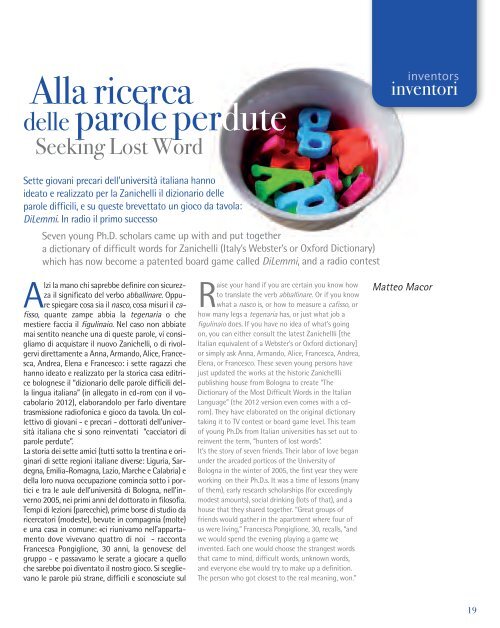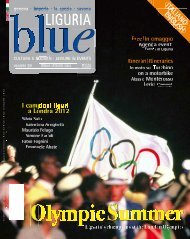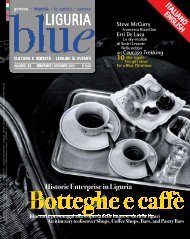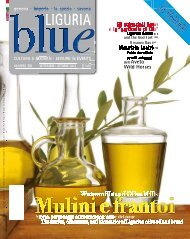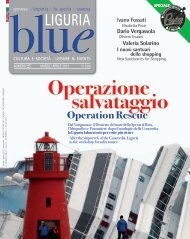Facciamoci sorprendere - Blue Liguria - Sagep
Facciamoci sorprendere - Blue Liguria - Sagep
Facciamoci sorprendere - Blue Liguria - Sagep
Create successful ePaper yourself
Turn your PDF publications into a flip-book with our unique Google optimized e-Paper software.
Alla ricerca<br />
delle parole perdute<br />
Seeking Lost Word<br />
Sette giovani precari dell’università italiana hanno<br />
ideato e realizzato per la Zanichelli il dizionario delle<br />
parole difficili, e su queste brevettato un gioco da tavola:<br />
DiLemmi. In radio il primo successo<br />
Seven young Ph.D. scholars came up with and put together<br />
a dictionary of difficult words for Zanichelli (Italy’s Webster’s or Oxford Dictionary)<br />
which has now become a patented board game called DiLemmi, and a radio contest<br />
Alzi la mano chi saprebbe definire con sicurezza<br />
il significato del verbo abballinare. Oppure<br />
spiegare cosa sia il nasco, cosa misuri il cafisso,<br />
quante zampe abbia la tegenaria o che<br />
mestiere faccia il figulinaio. Nel caso non abbiate<br />
mai sentito neanche una di queste parole, vi consigliamo<br />
di acquistare il nuovo Zanichelli, o di rivolgervi<br />
direttamente a Anna, Armando, Alice, Francesca,<br />
Andrea, Elena e Francesco: i sette ragazzi che<br />
hanno ideato e realizzato per la storica casa editrice<br />
bolognese il “dizionario delle parole difficili della<br />
lingua italiana” (in allegato in cd-rom con il vocabolario<br />
2012), elaborandolo per farlo diventare<br />
trasmissione radiofonica e gioco da tavola. Un collettivo<br />
di giovani - e precari - dottorati dell’università<br />
italiana che si sono reinventati “cacciatori di<br />
parole perdute”.<br />
La storia dei sette amici (tutti sotto la trentina e originari<br />
di sette regioni italiane diverse: <strong>Liguria</strong>, Sardegna,<br />
Emilia-Romagna, Lazio, Marche e Calabria) e<br />
della loro nuova occupazione comincia sotto i portici<br />
e tra le aule dell’università di Bologna, nell’inverno<br />
2005, nei primi anni del dottorato in filosofia.<br />
Tempi di lezioni (parecchie), prime borse di studio da<br />
ricercatori (modeste), bevute in compagnia (molte)<br />
e una casa in comune: «ci riunivamo nell’appartamento<br />
dove vivevano quattro di noi - racconta<br />
Francesca Pongiglione, 30 anni, la genovese del<br />
gruppo - e passavamo le serate a giocare a quello<br />
che sarebbe poi diventato il nostro gioco. Si sceglievano<br />
le parole più strane, difficili e sconosciute sul<br />
Raise your hand if you are certain you know how<br />
to translate the verb abballinare. Or if you know<br />
what a nasco is, or how to measure a cafisso, or<br />
how many legs a tegenaria has, or just what job a<br />
figulinaio does. If you have no idea of what’s going<br />
on, you can either consult the latest Zanichellli [the<br />
Italian equivalent of a Webster’s or Oxford dictionary]<br />
or simply ask Anna, Armando, Alice, Francesca, Andrea,<br />
Elena, or Francesco. These seven young persons have<br />
just updated the works at the historic Zanichellli<br />
publishing house from Bologna to create “The<br />
Dictionary of the Most Difficult Words in the Italian<br />
Language” (the 2012 version even comes with a cdrom).<br />
They have elaborated on the original dictionary<br />
taking it to TV contest or board game level. This team<br />
of young Ph.Ds from Italian universities has set out to<br />
reinvent the term, “hunters of lost words”.<br />
It’s the story of seven friends. Their labor of love began<br />
under the arcaded porticos of the University of<br />
Bologna in the winter of 2005, the first year they were<br />
working on their Ph.D.s. It was a time of lessons (many<br />
of them), early research scholarships (for exceedingly<br />
modest amounts), social drinking (lots of that), and a<br />
house that they shared together. “Great groups of<br />
friends would gather in the apartment where four of<br />
us were living,” Francesca Pongiglione, 30, recalls, “and<br />
we would spend the evening playing a game we<br />
invented. Each one would choose the strangest words<br />
that came to mind, difficult words, unknown words,<br />
and everyone else would try to make up a definition.<br />
The person who got closest to the real meaning, won.”<br />
inventors<br />
inventori<br />
Matteo Macor<br />
19


